National Day for Truth and Reconciliation
Sept. 30 is National Day for Truth and Reconciliation in Canada
Search for academic programs, residence, tours and events and more.
Sept. 30 is National Day for Truth and Reconciliation in Canada
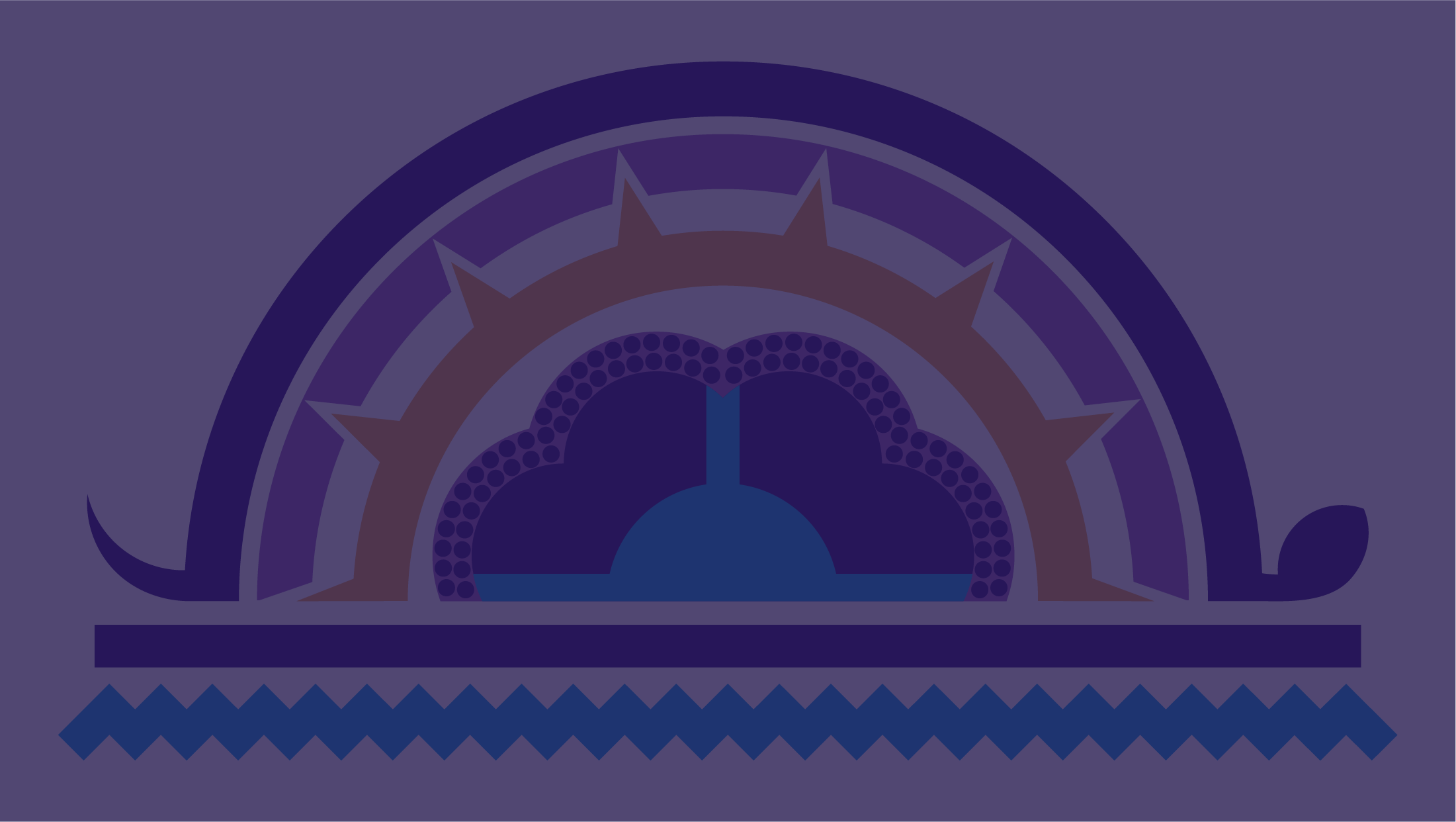
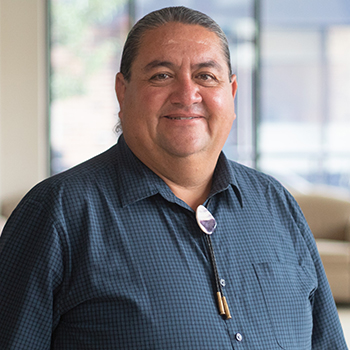
On the National Day for Truth and Reconciliation, we honour the lost children and survivors of residential schools, their families, and communities – and we recognize and reflect on the tragic and painful history and ongoing impacts of residential schools in Canada.
Wilfrid Laurier University will continue to amplify the truth of the continuing legacy of colonial trauma and history of residential schools and build towards reconciliation. We encourage the university community to engage in learning activities and reflection, and to give support and care to our Indigenous community members.
Darren Thomas
Associate Vice-President: Indigenous Initiatives
Starting on Sept. 23, Laurier will fly The Survivor’s Flag on all campuses. It will be lowered to half-mast on Sept. 30 to mark National Day for Truth and Reconciliation.
Created through consultation with Inuit, Mi’kmaq, Atikamekw, Cree, Ojibway, Dakota, Mohawk, Dene, Nuu-chah-nulth, Secwepemc and Métis survivors, the flag is meant to honour residential school survivors and all the lives and communities impacted by the residential school system in Canada.
Survivor's flag image courtesy of the National Centre for Truth and Reconciliation.
On Sept. 30, Laurier departments on all campuses are invited to display red dresses in their work areas to honour the lives of missing and murdered Indigenous women, girls, and Two-Spirit (MMIWG2S+) individuals in Canada.
Laurier also participates in the Red Dress Day Initiative on other days of national significance, including Red Dress Day on May 5, the Women’s Memorial March on Feb. 14, and the National Day of Action for Missing and Murdered Indigenous Women and Girls on Oct. 4.
This year marks 10 years since the release of the final Truth and Reconciliation Commission Report.
Since that time, Wilfrid Laurier University has committed to and taken steps towards reconciliation efforts and decolonization across the activities and operations of the institution. While we have made progress, including the creation of Indigenous leadership positions, the expansion of Indigenous Student Services, and the creation of the Indigenous Strategic Plan, there is always room for growth.
I want to encourage the Laurier community to engage in thoughtful reflection beyond September 30th. Reconciliation is ongoing work, and it is our shared responsibility to continue advancing it. Let us remain committed to reconciliation in both words and actions.
Emily Daniel
Director, Office of Indigenous Initiatives
In 2015, the Truth and Reconciliation Commission (TRC) of Canada recorded testimony of more than 6,000 survivors affected by residential schools. These testimonies were published in a report detailing the experiences and impacts of the residential school system, creating a historical record of its legacy and consequences. Read The Survivors Speak for the Survivors’ stories and lived experiences.
An outcome of the TRC’s report into the history and legacy of the Canadian residential school system was this document detailing 94 calls to action across a wide range of areas including education, health, child welfare, and culture.
The residential school’s crisis line is available 24 hours a day for anyone experiencing pain or distress as a result of a residential school experience. Support is available at 1.866.925.4419.
Wearing an “Every Child Matters” orange shirt is a symbolic gesture to acknowledge the truths of Canada’s past and commemorate those harmed by the residential school system.
Laurier’s orange shirt for 2025 is designed by student Arrianna Carello.
“I thought about all the things that I’ve learned and experienced since coming to Laurier and decided that I really wanted to represent community,” says Carello. “I’ve built a solid community here and I really never experienced that before.”
The Canadian Council for the Advancement of Education (CCAE) awarded Laurier's Brantford’s Marketfest a silver medal for Best Reconciliation event at their 2025 Prix d’Excellence awards.
Marketfest: In Peace and Friendship was a two-day celebration of contemporary Indigenous thinkers, makers and musicians held in Brantford’s One Market building.
We are excited to announce that Marketfest will return in 2026!
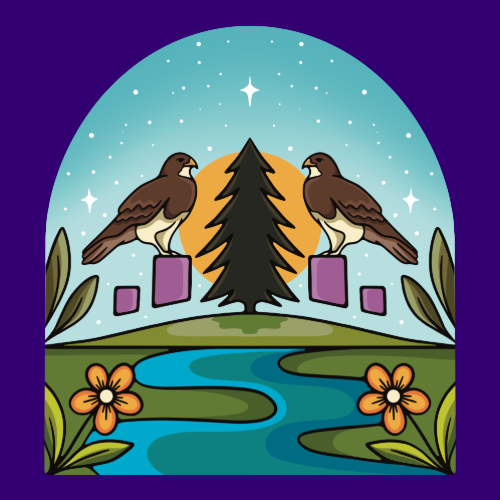
Alanah Astehtsi Otsistohkwa (Morningstar) Jewell (BA ’19) has been named WLUAA Alumni of the Year. Jewell was instrumental in the success of Brantford’s Marketfest by curating the vendor marketplace and contributed her Turtle Island Creation Story mural to Waterloo campus.
Jewell has recently partnered with Joe Fresh to design their “Every Child Matters” orange shirt in advance of National Day for Truth and Reconciliation.
On Aug. 20, students, staff and faculty gathered at the Brantford campus Indigenous Student Centre (ISC) to mark the annual sweetgrass harvest.
Laurier Student Sam Lewis and Indigenous Student Support Coordinator Sieara Miller pick this tall, natural wild grass grown in the ISC medicinal garden. It is used in smudging, healing and — as demonstrated in a workshop guided by Indigenous Student Services Counsellor Margaret Neveau — braided handicrafts.
"Sweetgrass represents the hair of Mother Earth," Neveau says.
Six Nations Polytechnic, a postsecondary organization recognized as a centre of excellence for Indigenous knowledge, and Wilfrid Laurier University have signed a memorandum of understanding (MOU) to strengthen academic ties to better serve Indigenous peoples in Ontario.
Discover the work of some of Laurier’s Indigenous researchers. Laurier experts are available to speak in advance of National Day for Truth and Reconciliation.
Research has shown that children who are visibly Indigenous or identify as African Canadians often cope with alienating school environments, adversarial student-administrator relationships and invisibility in school curricula. In their recent dissertation, Ann Marie Beals (Psychology) examined the role that teachers can play in improving educational experiences and outcomes for Afro-Indigenous students.
Laurier Brantford alumni Cody Groat (BA ’16, PhD ’23) is publishing his PhD dissertation, Always a Part of the Land: The Federal Commemoration of Indigenous Histories, with McGill-Queen’s University Press, slated for release in early 2026. Named one of 25 Laurier Brantford alumni of impact, his Laurier story was featured at length above.
While completing her MSc at Laurier, Christine Dunbar is honoured to be conducting research in her home territory. As an Indigenous woman born and raised in Yellowknife, NWT, she has witnessed the effects of rapid climate warming in the North and knows that long-term wildlife monitoring is needed as habitats change. Dunbar is studying the return of muskox to the Thaıdene Nëné Indigenous Protected Area.
“Muskox haven’t been seen in the boreal forest for over a century due to overhunting, yet recently they are moving back to the forest from the tundra,” says Dunbar. “I am trying to determine why. Is it to get away from predators or for foraging needs? Or do muskox need to cool down in the summer heat?”
Dunbar knows how important muskox and other wildlife are to Indigenous culture and practices, so it means a lot to her to monitor them alongside the Łutsël K'e Dene First Nation.
“I hope I am able to inspire other Indigenous youth and women in the territories to pursue what they are passionate about,” she says.
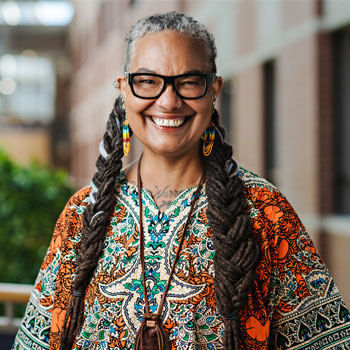
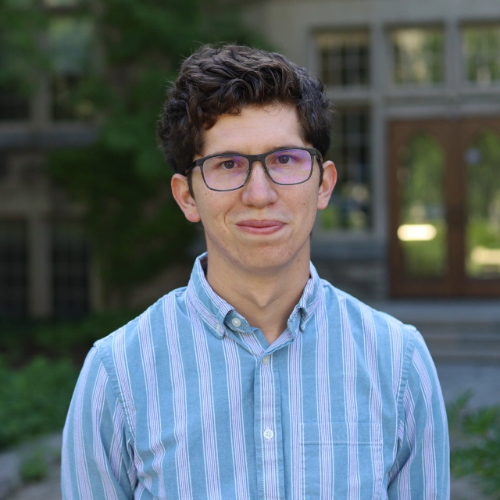
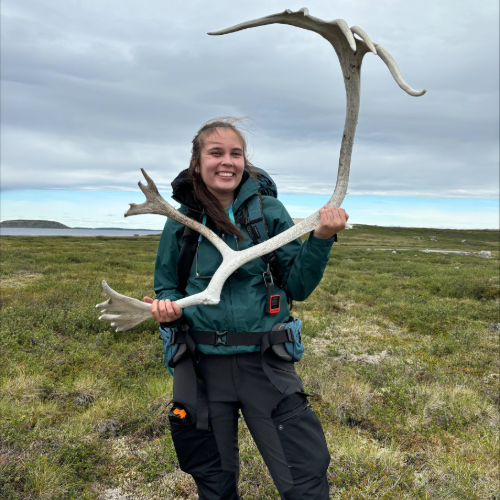
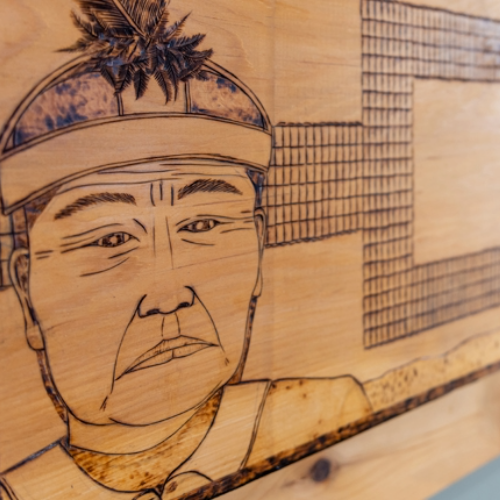
As a result of extensive consultations with Indigenous Elders, community members, faculty, staff, and students, Laurier’s Office of Indigenous Initiatives developed a university-wide Indigenization strategy that has been a core initiative of Laurier’s Action Plan for Equity, Diversity, Inclusion (EDI) and Indigeneity.
The Indigenous Strategic Plan was unanimously approved by the university Senate and Board of Governors in the summer of 2023.
This plan is informed by existing Indigenous scholarship on reconciliation and decolonization in the Canadian academy. It reinforces Laurier’s commitment to Indigenization and fostering a community that honors Indigenous knowledge and practices at Laurier. It also reflects Laurier’s belief that educational institutions have a duty to address the legacy of harm caused by colonial policies and practices.
Through Laurier Continuing Education, community members can learn about Indigenous history, knowledge and practices, and how systems in Canada have impacted Indigenous communities.
Explore courses and certificates offered through:
In partnership with the City of Brantford, Laurier developed a free online course to introduce members of the community to Indigenous peoples’ experiences, history and culture.
Learn More and Register for Introduction to Indigenous Matters
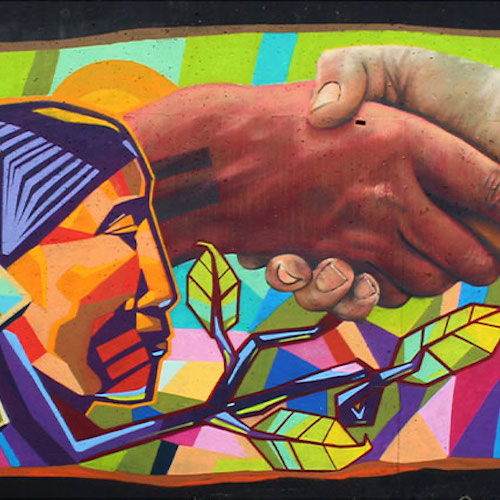
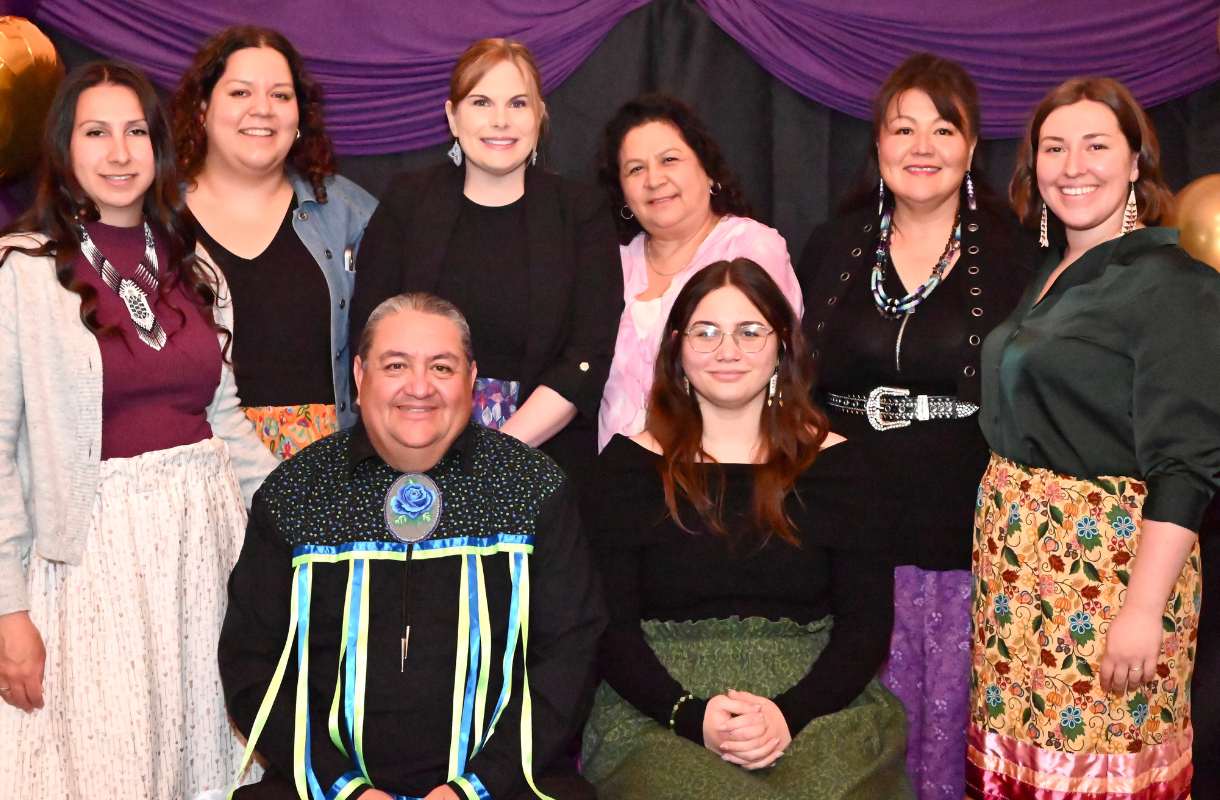
The Office of Indigenous Initiatives (OII) is responsible for leading Indigenization at Laurier, a priority in the Laurier Strategy that involves fully integrating Indigenous knowledges and practices at the university.
The OII also provides oversight to Indigenous Student Services, whose mandate is to build a positive student experience for Indigenous students, provide community for students and support them in culturally appropriate ways during their time at Laurier.
The Indigenous Student Emergency Fund is one part of the Indigenous Student Services’ circle-of-care approach to supporting Indigenous students at Laurier. Support staff at the Indigenous student centres work one-on-one with students to ensure they have access to the unique resources, support, and community they need to succeed in their studies and thrive at Laurier. This multi-campus fund is available to provide relief to Indigenous students facing unexpected financial crisis, no matter where they’re studying from.
If you are in a position to do so, please consider donating in support of the Indigenous Student Emergency Fund in honour of this National Day for Truth and Reconciliation. Thank you for your generosity.